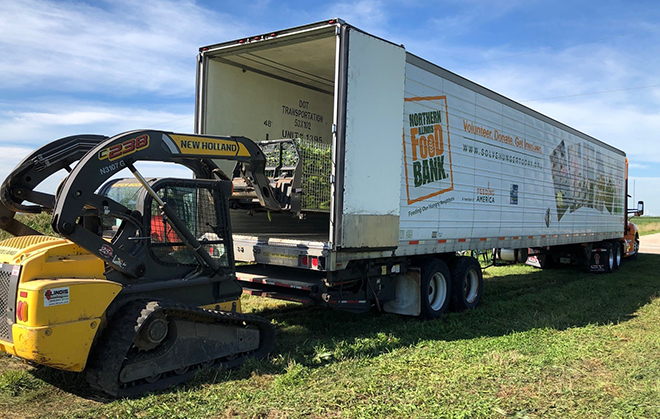Roundtable forum follows passage of ‘farm-to food bank’ bill; NIFB, state and farm-related entities come together to discuss increasing farm partnerships
By Jane Charmelo

PHOTOS COURTESY OF NIFB Belvidere Republican
New legislation will help food banks, such as the Geneva-based Northern Illinois Food Bank, create partnerships with Illinois farmers, in order to offer fresh produce and other commodities to food pantries across the state of Illinois.
Last year, state Sen. Linda Holmes supported legislation that would provide more farm-grown, nutritious foods to food pantries around the state, which resulted in the passage, by the Illinois General Assembly, of HB2879, thus creating the Farm to Food Bank Program.
According to the Illinois General Assembly website, this legislation “Creates the Illinois Farm to Food Bank Program Act. Establishes the Illinois Farm to Food Bank Program within the Department of Human Services (IDHS) to help expand the availability of nutritious, locally grown, raised, or processed foods for Illinois’ emergency food system.”
Among the food banks in Illinois, one of the involved parties is the Geneva-based Northern Illinois Food Bank, or NIFB, which helped organize a roundtable discussion in November 2023. Attending were the IDHS, Feeding Illinois, the Greater Chicago Food Depository, the Illinois Farm Bureau, the Illinois Farmers Market Association, the University of Illinois Sustainable Technology Center, local farmers and food pantries.
The bill, said Corey Incandela, NIFB communications and advocacy specialist, and who attended the meeting, “essentially created a state farm-to-food bank program” that will provide funding “for food banks to purchase produce from farms.”
He said $2.5 million is slated to be distributed among the state’s food banks.
According to the NIFB, “The program will connect food banks with farms to purchase products like fruits, vegetables, milk, cheese, meat and eggs directly from Illinois producers.
“It will also provide grants to support the aggregation, processing, transportation, storage or distribution of agricultural products to underserved areas.”
The NIFB serves 13 counties, including Boone County, according to Incandela.
He summarized the meeting by saying, “The roundtable event with Senator Holmes was a strategy-building session for the new program and we anticipate many farmers and food pantries benefiting from this program.”
“It’s still in process,” Incandela related,” in terms of organizing a reimbursement program for the food banks that purchase qualifying food.
Since the bill passed last year and was funded in the state’s budget, “IDHS has been tasked with creating the rules for the program and has been holding weekly calls with food banks across the state to discuss program rules and what we would like to have included in the program,” he described. “As of now, IDHS is not done with the rulemaking … and we are working on potential ways to get funds distributed as soon as possible so that Northern Illinois Food Bank can purchase foods in [fiscal year] 2024.”
Incandela also noted that the NIFB is “waiting to see if food [already] purchased can be reimbursed” through this new program, for fiscal year 2023-24, which runs from July 1, 2023, to June 30, 2024.
He mentioned that the food bank already receives allocated federal funds to purchase produce from Illinois farmers, funneled through the umbrella of Feeding Illinois.
A NIFB release mentions, as an example, a partnership with Angelic Organics in Caledonia, which provides a variety of squash, such as butternut, acorn and kabocha.
The farm donated 3,850 pounds of produce Nov. 29, according to the release.
“Northern Illinois Food Bank is experiencing a historically high number of neighbors coming to its network … serving 550,000 neighbors a month, and provides 82 million meals a year to neighbors facing hunger throughout our 13-county service area in rural and suburban Northern Illinois,” Incandela stated.
Among those 13 counties, the NIFB, a member of the Feeding America Network, works with over 900 food pantries, soup kitchens and feeding programs.
Incandela noted that while the NIFB’s budget is up compared to years past, “This is a much welcome and important program. This program is designed to create a secondary market for farmers across the state and allow food banks to have additional commodities that are then sent to member food pantries.”
He shared that since the program is still being defined, there are “a lot of unknowns, being the first year.”
He stated in January, “I cannot say definitely when we will be able to purchase food and/or when the final budget will be completed but we are hoping very soon.”
Incandela said he hopes potential upcoming legislation will create “a dedicated line item” for the Farm to Food Bank Program, adding, “The ultimate goal is to get more funding” to purchase food.
However, Incandela emphasized that he hopes farmers across the state will participate in the new state program, commenting, “The more partnerships the better.”
For more information on the Northern Illinois Food Bank, visit solvehungertoday.org.


